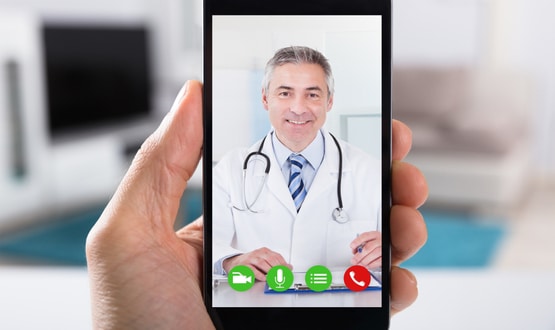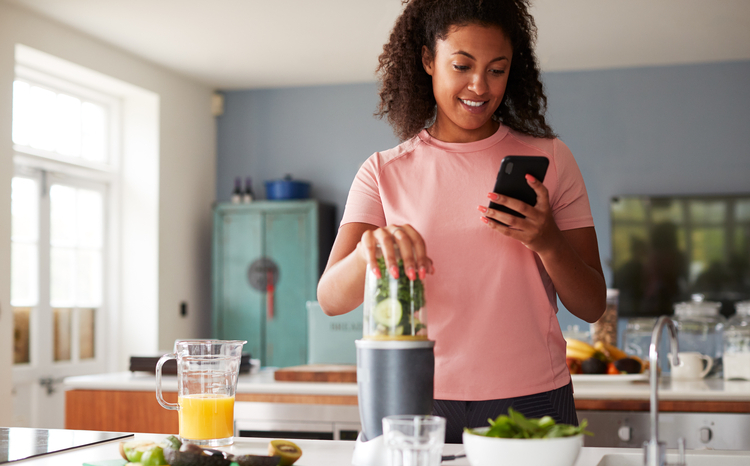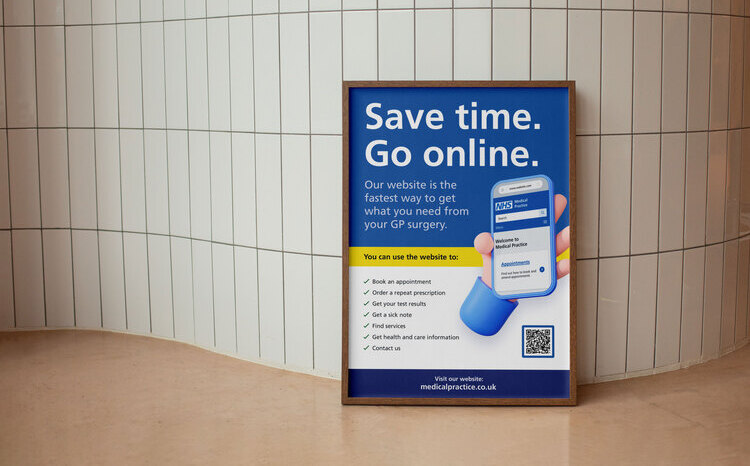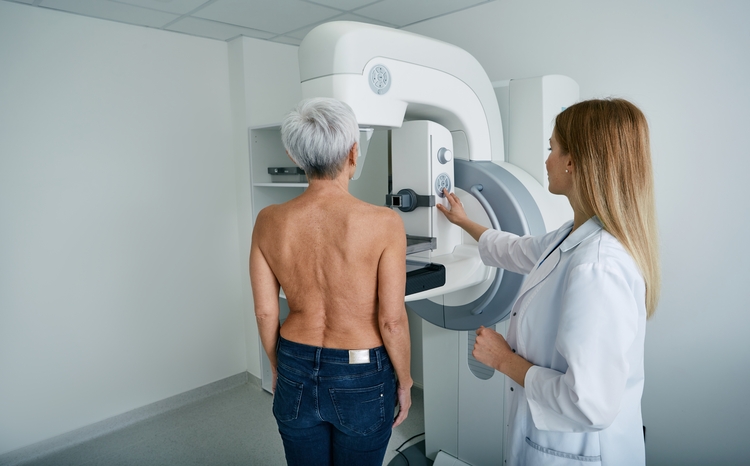The month primary care went remote due to Covid-19
- 15 April 2020

The Covid-19 crisis has, in a few short weeks, led to the most dramatic transformation of primary care services ever seen, with most consultations moved to remote and virtual to comply with social distancing.
In the space of a few short weeks primary care services in the UK have switched wholesale from 1.2m face-to-face consultations a day to the vast majority of consultations carried out remotely.
According to a 12 April BBC report, GPs are now seeing just seven in every 100 patients face-to-face, following a “remarkable” shift to online and telephone appointments across England in response to the coronavirus crisis.
This is a truly remarkable reconfiguration of the NHS front door that has so far attracted relatively little attention in the national coverage of coronavirus, and may be one of the mist radical long-term changes to the way health services are delivered in the UK.
Sweeping away long-standing barriers
Dr Clare Gerada, former chair of the RCGP and head of digital, described in a recent HSJ article how her practice has gone digital using online triage, electronic prescriptions, text messaging and video conferencing tools.
“At my own practices across London, around 99 per cent of all our work is now online,” she said.
What Covid-19 has provided is an imperative, allied with an incredible amount of hard work, partnership, and pragmatism that has swept away long-standing barriers that have previously slowed the spread and adoption of digital first primary care.
National leaders recognised from early on that digital would have a key part to play in responding to the crisis. Early on in the crisis NHSX issued commendably clear guidance that information governance concerns must not get in the way of adopting digital tools, and offering clarity on mobile messaging apps such as Whatsapp, use of video consultations and home working.
Removing blocks
The lightning shift to remote care has been made possible by the fact that most of the digital tools needed, electronic patient records, online triage, electronic prescribing, messaging and video consultations, were already to hand, they just weren’t being used very widely. The majority of work over the past few weeks has instead been able to focus on spreading availability of existing tools, and removing blocks.
Where there have been capability gaps NHSX has moved to quickly fill them. A 48-hour national procurement was run for video consultation platforms, with 11 chosen.
This followed national procurements being carried out for the Attend Anywhere video consultation platform for use in secondary care and MIcrosoft Teams as a collaboration platform across the NHS.
The NHS Digital team behind Microsoft Teams rollout told a recent Digital Health Digital responses to Covid-19 webinar that Teams had been rolled out to a remarkable 1.25 million staff in a little over a month. This represents probably the fastest ever roll-out of any digital platform across the health service.
Learning to adapt
Most GPs and practice staff are rapidly learning to adapt pragmatically to working remotely.
One Commissioning Support Unit lead in primary care transformation told Digital Health News: “It’s only 18-months ago I was talking to CCGs and practices about things like video consultations and they just weren’t interested. Now it’s completely mainstream.”
A recent BMJ practice guideline authored by Professor Trish Greenhalgh stresses that GPs are having to adapt quickly to a new epidemic requiring social distancing
“Clinicians are thus faced with a new disease and a new way of interacting with patients,” the guidance states.
The article goes on to advise that telephone consultations are adequate for many consultations, and patients seeking advice should be directed to an online symptom checker like NHS111.
“The telephone is a familiar and dependable technology, which is adequate for many covid-19 related conversations,” states the article.
“However, video can provide additional visual information, diagnostic clues, and therapeutic presence.”
Starting from a low base
Dr Shaun O’Hanlon, medical director at primary care system supplier EMIS says demand for video conferencing has taken off, growing by 150% over the past couple of weeks “though starting from a very low base”.
“But the overwhelming majority of remote consultations remain by telephone, that’s the technology that everyone has,” he adds.
Speaking on a recent Digital Responses to Covid-19 Webinar, Dr O’Hanlon said that he believed that every bit as important was the very rapid roll-out of the electronic prescribing service (EPS), enabling 100% of patients to choose where to pick up their prescriptions.
“EPS is also now supporting the ‘popup clinics’ and other reconfiguration of frontline services to meet the coronavirus pandemic,” he said. Patients can now nominate where they collect their prescription from.
The increase in EPS use has already been dramatic and is set to continue to rocket, with work also now underway to extend EPS into a variety of community settings.
Connectivity problems
Unsurprisingly, such a rapid reconfiguration and shift to home working has not been without problems. There have been reports in some areas of problems accessing practice clinical systems across Virtual Private Networks, and of some clinical systems working better remotely than others.
The shift to home working has also in places exposed the consequences of under-investment in NHS IT infrastructure, networks and hardware, with some GPs reporting they are unable to run clinical software remotely.
The primary care revolution has been digitised
But on the whole – even accepting plenty of local frustrations with networks, hardware, connectivity – this radical shift has been achieved with remarkably little fuss. The crisis has accelerated digital adoption as never before.
As a result an absolute revolution has taken place in how primary care is delivered and accessed by patients. And the question is now surely whether the familiar world of face-to-face primary care services will ever return once the crisis has receded.
A sign of just how far primary care has changed in a few short weeks is that recently retired GPs, returning to support the NHS during the crisis, are having to be given orientation in how to use new systems like triage and video consultations that have changed the face of primary care.
According to BBC figures in 2019 less than 1% of GP appointments were done by video. By Easter the coronavirus pandemic meant GPs were seeing just seven in every 100 patients face-to-face.
The NHS Long Term Plan, published in 2019, included the commitment that digital first patient care will become an option for every patient “over the next five years”. Covid-19 has transformed that in a matter of weeks, with remote care now the only option for most patients, and the NHS is unlikely to be the same again.
While face-to-face consultations will surely return, the experience of many patients and health professionals during the crisis will be that remote care is absolutely good enough in many, many cases, and that when supported with robust digital tools many patient appointments simply shouldn’t revert back to in person.
National work being done
The work being undertaken nationally to enable all parts of NHS primary care to offer remote care through video consultations is the subject of the next digital Responses to Covid-19 Briefing and Q&A Webinar.
Panelists include, Dr Minal Bakai, national clinical lead and deputy director for digital first primary care at NHS England and NHS Improvement and Trish Greenhalgh, professor of primary care at the University of Oxford.





2 Comments
I am loving General Practice and feel safe the way we now work in this virtual consult world with video. The challenge now will be developing the skills and confidence to move forward. For very experienced doctors who are familiar with their own patients this should be easy. I have a strong view that GP’s should not visit residential facilities /rest homes and aim to do 99% consults virtually. We will not be seeing any coughs/colds face to face for the at least the next 18 -24 months and with this new way of medicine why do be need to? I predict GP will be will go Green.
Welcome to the world of BABYLON
Comments are closed.